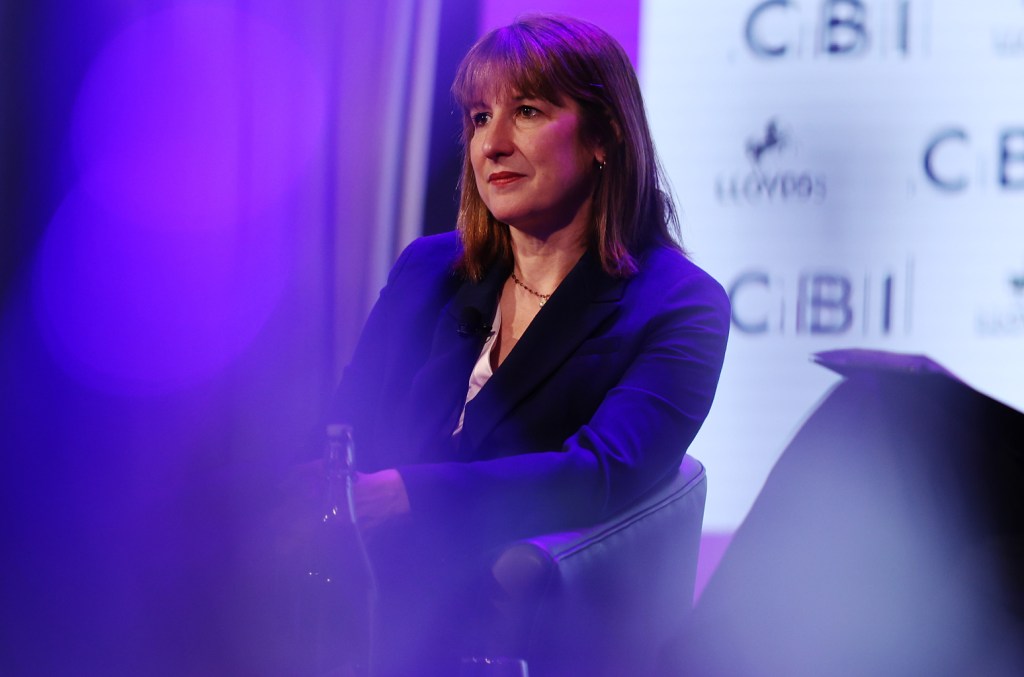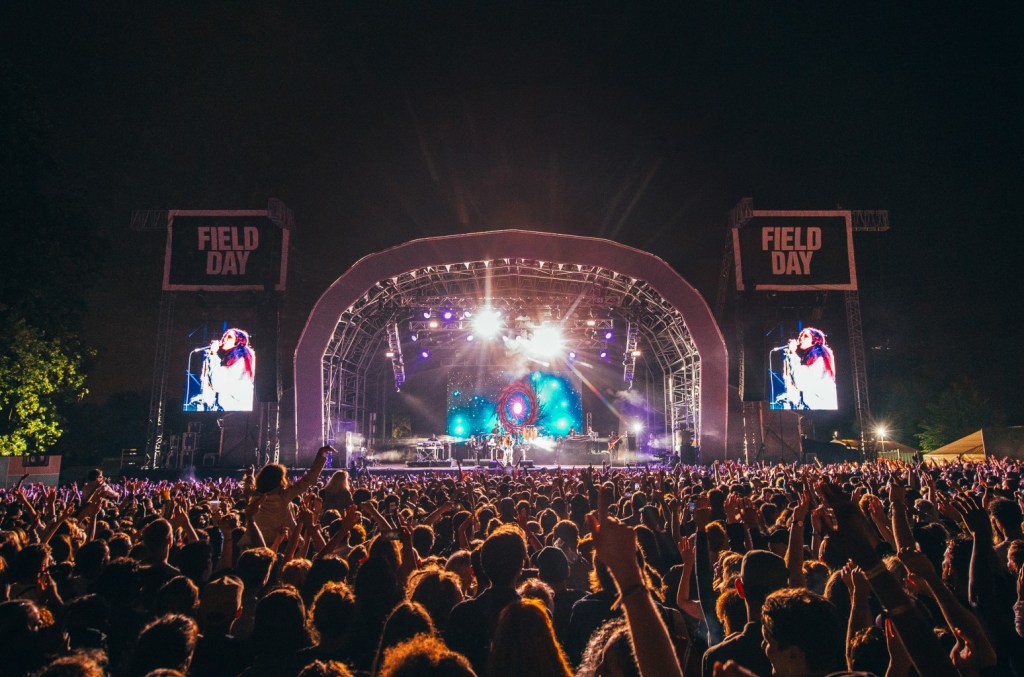United Kingdom

Trending on Billboard
The U.K. government hopes to decrease the price of resale tickets by an average £37 per ticket ($48 USD), according to a new report released released Wednesday (Nov. 19) in which it outlined its plan to outlaw ticket resale above face value.
According to a memo outlining the new rules, “Music and sport fans will no longer be ripped off on the ticket resale market thanks to new measures which will destroy the operating model of ticket touts,” also known as scalpers. The memo, released by the country’s Department for Business and Trade and Department for Culture, Media and Sport, adds that Prime Minister Keir Starmer’s government will make it “illegal for tickets to concerts, theatre, comedy, sport and other live events to be resold for more than their original cost.” The news was first reported by multiple U.K. outlets on Monday (Nov. 17) prior to the memo’s release.
Related
The new rules effectively make ticket resale above face value — defined as “the original ticket price plus unavoidable fees, including service charges” — illegal. The law limits the service fees that resale sites can charge and requires platforms like StubHub and Viagogo “to monitor and enforce compliance with the price cap.” The law also bans fans and resellers from buying more tickets than they are legally entitled to purchase during an initial ticket sale.
The U.K. government’s website features supportive quotes from politicians, music managers and artists about the bill, including U.K. Business Secretary Peter Kyle, who said the legislation taking on scalpers was meant to “smash their model to pieces and make sure more fans can enjoy their favourite stars at a fair price.”
In her own statement, U.K. Culture Secretary Lisa Nandy compared ticket scalpers to “a shadow industry, acting without consequence” while Dan Smith of the band Bastille described the legislation as “a good step towards protecting music fans from being ripped off.”
The new rules apply to both ticket resale platforms and social media sites where fans buy and sell goods. Violating the new regulations, according to the government, could result in large financial penalties from the U.K.’s Competition and Markets Authority (CMA).
Related
“Government analysis suggests that these measures could save fans around £112 million annually [$146 million USD], with 900,000 more tickets bought directly from primary sellers each year,” the government’s website reads.
The law is meant to build on a development from September in which the Competition and Markets Authority secured commitments from Ticketmaster to give U.K. fans 24 hours’ notice if Ticketmaster plans to use tiered pricing and provide clearer information about how the company’s online queues work, among other measures.
“The CMA’s enforcement action in this case, and the measures agreed with Ticketmaster, send a clear message to all ticketing websites that fans must have access to clear and timely pricing information with accurate ticket descriptions, especially where there are different pricing models and queues in play,” the government’s website reads. “In the future, the CMA will be able to respond even more swiftly and robustly to breaches of consumer law.”
The new legislation drew both praise and condemnation from different corners of the music industry. U.S.-based pro-ticket resale group the National Association of Ticket Brokers warned in a statement that it does “not support efforts to thwart competition. We discourage laws that impose price caps that make it more difficult for ticketing companies to compete with one another.”
Related
Others were more supportive, with Chris Lipscomb, managing girector for AXS U.K., telling Billboard in a statement, “We strongly support the UK government’s efforts to strengthen safeguards around ticket resale, which align with AXS’s longstanding practices in support of fair fan access.”
Matt Kaplan, who heads up U.K. and EU operations for fan-to-fan exchange Tixel, said “the UK’s move to outlaw touting is a huge win for fans, artists and the wider industry, and we fully support this long-overdue reform. Tixel was built to tackle these exact problems, and after nearly a decade fighting for fair, transparent resale in multiple markets around the world, we’re proud to see a framework emerge that protects fans, restores trust and shuts out the bad actors.”
In a statement to Billboard, Nathaniel Marro with the National Independent Talent Organization (NITO) added, “We hope policymakers stateside are paying attention and that reining in predatory resellers is a global movement.” Also in a statement, Stephen Parker of the National Independent Venue Association (NIVA) called on “state lawmakers throughout the United States to follow the United Kingdom’s (UK) proposed ticket resale price cap.”
Trending on Billboard
Europe’s largest music market will soon be announcing a ban on ticket resale for profit, elating music fans while roiling investors in secondary ticketing companies like StubHub and Vivid Seats.
Multiple outlets in the United Kingdom are reporting that the Labour Party government of Prime Minister Keir Starmer will announce a plan to crack down on ticket scalping this week. Outlets like The Guardian are reporting that Starmer’s government had considered capping resale at 30% above a ticket’s original face value, but ultimately opted to ban the resale of tickets above face value following significant pressure from artists and industry groups.
Related
According to The Guardian, ticket holders for popular concerts like Coldplay and Dua Lipa will be able to resell tickets on sites like StubHub and Viagogo, but not charge more than they paid for the tickets. Resale sites would be allowed to charge fees on top of that price, but the fees would be limited and set by regulators. The resale ban would also cover social media sites, which some resale site operators have claimed would serve as fraud-heavy alternatives if markets like StubHub were shut down.
The new regulations will also include purchasing limits on tickets and mandates from the Competition and Markets Authority (CMA) that resale sites like StubHub will be responsible for policing their own platforms.
The news sent the share price for StubHub’s U.S. company, StubHub Holdings, tumbling on Monday (Nov. 17); the stock ultimately closed down 13.8 percent. StubHub has endured a brutal November, with shares down a combined 33% after the company failed to provide a financial forecast for the current quarter.
The publicly traded StubHub Holdings — which owns Viagogo — is a different company from the U.K. StubHub brand. The Competition and Markets Authority forced the firms to split into two companies following the merger of Viagogo and StubHub in 2020.
Representatives for Live Nation applauded the deal, telling Billboard in a statement that “Live Nation fully supports the UK government’s plan to ban ticket resale above face value. Ticketmaster already limits all resale in the UK to face value prices, and this is another major step forward for fans — cracking down on exploitative touting to help keep live events accessible. We encourage others around the world to adopt similar fan-first policies.”
Earlier this month, more than 40 British artists, including Sam Fender, Radiohead and The Cure, sent a public letter to Starmer urging the U.K. prime minister to “stop touts [scalpers] from fleecing fans” and cap the price of resale tickets at face value. The pressure campaign followed a recent CMA study that found U.K. tickets sold on resale sites were typically marked up 50 percent.
Trending on Billboard
Four of the U.K.’s leading artists are among those coming together to call on the British Prime Minister, Sir Keir Starmer, to honour a pledge to protect fans from online ticket scalpers, also known as touts.
Coldplay, Dua Lipa, Radiohead and Sam Fender are all signatories to a joint statement published Thursday (Nov. 13), in which artists, managers and fan groups are asking Starmer to commit to resale price cap legislation in the U.K.
Related
In its manifesto for the 2024 general election, the Labour Party proposed policies for new consumer protections on ticket resales. This evolved into an industry consultation in January, which invited views from venues, promoters, fans and other parties on a resale price cap, considering options from face value to a 30% uplift.
On Oct. 5, seven months after the consultation closed, the U.K.’s culture minister, Ian Murray, confirmed that the current Labour government would press ahead with plans for a price cap on resale tickets — but the specifics of these plans have yet to be revealed.
Now, dozens of industry figures are calling for the Prime Minister to make the commitment to price cap legislation in the next King’s Speech, which is set to take place next spring.
In the statement, the coalition says new protections are needed to “help fix elements of the extortionate and pernicious secondary ticketing market that serve the interests of touts, whose exploitative practices are preventing genuine fans from accessing the music, theatre and sports they love.”
Related
It adds: “For too long certain resale platforms have allowed touts to bulk buy and then resell tickets at inflated prices, forcing fans to either pay above the odds or miss out entirely. This erodes trust in the live events sector and undermines the efforts of artists and organisers to make shows accessible and affordable. Introducing a cap will restore faith in the ticketing system, help democratise public access to the arts in line with the Government’s agenda and make it easier for fans to spot illegal behaviour, such as ticketing fraud.”
Alongside the aforementioned names, the list of signatories includes The Cure’s Robert Smith, New Order, Mark Knopfler, Iron Maiden, PJ Harvey, alt-J, Aluna Francis, Bastille, Ben Howard, Brix Smith, Mogwai, Nick Cave & The Bad Seeds and Nubiyan Twist. (View the full list below.)
With the statement on Thursday, the group of signatories joins consumer choice organisation Which?, the FanFair Alliance, O2 and the Football Supporters’ Association, along with organisations representing the music and theatre industries, venues, managers and ticket retailers, among others.
The statement arrives alongside a new investigation from Which?, which outlines the global touting operations targeting the U.K.’s ticketing industry. The group identified prolific scalpers in locations including Brazil, Dubai, Singapore, Spain and the United States, all of whom were bulk-buying tickets for live music and sporting events in the U.K. before relisting them at inflated prices on platforms such as StubHub and Viagogo.
Related
Examples of this practice included tickets for Oasis’ Wembley Stadium shows, which were listed for prices as high as £3,498.85 ($4,594.04) on StubHub and £4,442 ($5832.41) on Viagogo. Another finding showed that a seat for the recent Minnesota Vikings vs. Cleveland Browns NFL clash at Tottenham Hotspur Stadium was listed for £3,568.39 ($4685.35) on StubHub.
Elsewhere, Which? also found multiple cases of speculative selling, which is when tickets are listed on secondary sites for double the price — even though the seller has not bought them yet.
In a press release, Lisa Webb, a consumer law expert at Which?, said: “Today’s joint statement makes clear that artists, fan organisations and consumers reject the broken ticketing market that has allowed touts to thrive for too long. The Prime Minister pledged to protect fans and a price cap on resold tickets will be a critical step towards fixing this industry, but he must commit to this legislation by including it in the next King’s Speech.”
Webb concluded: “Further reforms are also needed to ensure sellers actually own the tickets they advertise before listing them, that resale platforms ensure the identities of sellers and key information about a ticket are verified and that the new rules are effectively enforced.”
Artist signatories: Alfa Mist, alt-J, Aluna Francis, Amy Macdonald, Andro, Bastille, Ben Howard, Brix Smith, Charlotte OC, Coldplay, Dana Margolin (Porridge Radio), Dua Lipa, Graeme Park, Howard Jones, Idlewild, Iron Maiden, Johnny Marr, Keane, Kelli-Leigh, Low Island, Mark Knopfler, Mogwai, New Order, Nick Cave & The Bad Seeds, Nick Mason, Nubiyan Twist, Orlando Higginbottom, PJ Harvey, Quantic, Radiohead, Revenge of Calculon, Robert Mitchell, Robert Smith (The Cure), Sam Fender, SNAYX, Sweetie Irie, The New Eves, Travis.
Organisations: Fan Fair Alliance, Featured Artists Coalition, Football Supporters Association, LIVE, Music Managers’ Forum, Music Venue Trust, Musicians’ Union, O2, Society of London Theatre & UK Theatre, Society of Ticket Agents and Retailers (STAR), UK Music, Which?.
Ghetts, an award-winning rapper who resides in the United Kingdom, was arrested and held in custody due to a fatal hit-and-run incident that he was reportedly involved in. Earlier this week, Ghetts appeared in a London court to hear his charges as he awaits his fate during the investigation.
BBC News reports that Ghetts, real name Justin Clarke-Samuel, was in Stratford Magistrates’ Court this past Monday (October 20) to hear charges related to the alleged incident that took place on October 18 in London. The victim was a 20-year-old man who died from his injuries the same day Clarke-Samuel appeared in court.
Ghetts also performed as an actor and held a role on the Netflix science fiction show, Supacell.
The outlet adds that the 41-year-old rapper will be in custody and has a court appearance at the Barkingside Magistrates’ Court scheduled for October 27.
—
Photo: Getty
LONDON — The U.K. government shared its spending review on Wednesday (Jun. 11), Labour’s first since it won 2024’s parliamentary election. The U.K. music industry, however, has raised concerns that funds are not being prioritized for the sector and warned that “action is needed now” to ensure its stature on the global stage.
The review has been keenly anticipated as sectors look to Labour to stimulate the economic growth promised in its election manifesto. The last full spending review was issued by the previous Conservative government in 2021, but in July 2024 Reeves claimed the Conservative party had overspent by £21.9 billion ($29.6 billion) and that “a necessary and urgent decision” on budgets was required. The review sets out day-to-day budgets for government departments for the next three years, and details long-term investment plans until the end of the decade.
In the new review, chancellor Rachel Reeves shared spending plans for the NHS (National Health Service), and across housing, defense, transport and more. In recent months, the U.K.’s stakeholders have lobbied the Labour government for additional funds for the music industry, but their calls appear to have gone largely unheard.
Trending on Billboard
Last Thursday (May 29), an open letter from the PRS Foundation called on the government to pledge £10 million ($13.5 million) per year for music export and exchange, with the goal of promoting the U.K. music scene on a global stage. The letter was signed by over 350 figures in the industry, including Glastonbury boss Emily Eavis, Beggars Group founder and chairman Martin Mills and rock band Nova Twins. The signatories said the fund would “stimulate the long-term growth of the U.K. music industry” and pointed to South Korea and Australia as nations that had seen successful export programs in recent years.
Gee Davy, chief executive of AIM (Association of Independent Music), said in a statement to Billboard U.K.: “The U.K.’s music is a key element of our soft power, which creates jobs and value for the economy beyond some sectors receiving help in the government spending review. But a combination of economic shocks has hit our sector, with an amplified effect on grassroots and independent music.”
She added, “To regain our position on the global stage we urgently need the government to step in with an ambitious export strategy and commit to long-term investment, alongside incentives to boost music creation with a tax credit scheme similar to that in film. Action is needed now.”
There’s also concern about the Labour government’s commitment to alleviating the live music scene’s struggles in recent years. Recent data from the MVT (Music Venues Trust) indicates that two grassroots venues are closing every month in the U.K. and that the wider night time scene – including bars, clubs and suppliers – is suffering.
Michael Kill, chief executive of the NTIA (Night Time Industry Associations) says that while the government’s commitment to long-term energy infrastructure was a positive step, “venues are struggling to keep the lights on today” due to rising costs in operation. He outlined that the night time industry contributes £153 billion ($207 billion) to the U.K. economy every year, and employs 2.1 million people, but that businesses need “clarity” on what to expect in relation to business rates and potential tax hikes in the near future.
“We need a budget that understands our value, not one that inadvertently accelerates decline,” Kill said. “The government must work in partnership with us. The capital investment plans may look bold, but the devil is in the detail. We need immediate support, clear fiscal strategy, and genuine engagement ahead of the Autumn budget if we are to safeguard a safe, thriving, and sustainable night time economy.”
Music in education settings has also been a key area of focus in recent months with huge talent throwing their weight behind the cause. At the BRITs in March, rising star Myles Smith used his winners’ speech to call on the government to make music education more accessible in state schools. Ed Sheeran, meanwhile, led a campaign backed by Elton John, Harry Styles and Coldplay that called for additional funding for lessons and instruments.
Damian Morgan, employability and industry lead at dBs Manchester, says that the “U.K.’s global success in music is no accident – it’s the result of years of investment, opportunity and education. But right now, we’re at a critical tipping point.” The dBs institutes in Manchester, Bristol and Plymouth offer professional training for students with an interest in music technology, game design and the creative industries.
Morgan adds, “Without serious and sustained support, we risk leaving behind a generation of talent that simply can’t afford to access the opportunities others take for granted. We need the government to take this seriously: invest in music education, protect it in the curriculum, and ensure young people from all backgrounds can find their way into our world-leading music industry.”
CMAT’s newest single, “Take A Sexy Picture Of Me,” has a lightning-in-a-bottle quality that nothing she had released previously could quite compare.
The track, which will feature on the country-pop songwriter’s third LP Euro-Country (due Aug. 29 via AWAL), is bright, hooky and possessed of a subtle emotional pull. Under a soulful, spacious melody, the tone shifts continually: from self-reflection to blame-laying, from denial to weariness, frustration and regret.
So as much as this irresistible earworm encapsulates the Song of the Summer ethos with its easy, forthright and effortlessly cool arrangement, it also in a way defies it. It offers a pained and pointed depiction of body image struggles in a world of constant online commentary — evoking a sunlit mood with lyrics rooted in a wider, meaningful conversation. CMAT (an acronym of Ciara Mary-Alice Thompson) recently explained to BBC 6 Music that the track is about the mental anguish she has experienced, having previously received a flood of “nasty comments” on her physical appearance.
Trending on Billboard
Since its release last month, “Take A Sexy Picture Of Me” has taken on a life of its own, picking up significant traction on TikTok while also translating into real-world success. What started as a playful dance challenge by app user Sam Morris, a 37-year-old content creator based in Brighton, has snowballed into a trend. The routine follows along with the words of the second verse — “I did the butcher/ I did the baker/ I did the home and the family maker/ I did schoolgirl fantasies” — with participants miming chopping and baking actions.
Dubbed the “Woke Macarena” in reference to its simple choreography, the song has soundtracked over 28,000 TikTok videos in recent weeks, with stars such as Lola Young and Julia Fox getting involved. CMAT, meanwhile, is currently in the midst of an extensive festival run: at the end of May, she thrilled a Main Stage crowd at London’s Wide Awake festival, while a Pyramid Stage slot at Glastonbury is on the horizon. Last week (June 6), she supported Sam Fender at London Stadium in front of an audience of 82,500 — the venue’s biggest sold-out show to date.
Prior to this, CMAT and her band delivered an electrifying rendition of “Take A Sexy Picture Of Me” on Later… With Jools Holland, kicking off the Euro-Country campaign in earnest. The performance proved that she wants viewers to understand what she’s singing about on the deepest level possible, and if that requires theatrical emotions and dancing, she is more than willing to oblige. It wouldn’t be remiss, then, to suggest that prestige slots on U.S. late night shows may soon come along.
“CMAT is firmly and deservedly positioning herself as one of this summer’s breakout stars,” says Adam Read, music programs manager at TikTok UK. “This is a track that speaks directly to identity, self-image and transformation, all while being incredibly catchy. The fact that the choreography took shape organically and is now being performed at live shows by entire crowds is exactly the kind of cultural crossover we love to see.”
Unlike this time last year, when Sabrina Carpenter’s smash hit “Espresso” was dominating the British (and global) airwaves, there arguably hasn’t been a Song of the Summer frontrunner just yet. Alex Warren’s ballad “Ordinary” has remained firmly at the summit of the Official U.K. Singles Chart for the past 12 weeks — the longest-running U.K. No. 1 of the 2020s — yet its sighing, plaintive melody doesn’t quite speak to the easy-breezy feel of the season.
Read and the team at TikTok UK, however, have predicted “Take A Sexy Picture Of Me” as a contender, alongside Afrobeats star Darkoo’s “Like Dat” and Charli xcx’s “Party 4 U.” The latter is a 2020 fan favorite that peaked at No. 42 on the Billboard 200 last month (May 31), with Atlantic Records having pushed it towards U.S. contemporary hit radio over the spring.
With over 575,000 video creations under the #SongOfTheSummer hashtag, TikTok is a key launchpad for new music at this time of the year. CMAT, meanwhile, has gained over 26.6 million content views in the past month alone, leading to a 71% growth in her follower count and, in turn, pushing her monthly Spotify listeners over the 1 million mark. The song is continuing to climb Spotify’s Viral 50 — Global chart and is approaching 4 million streams on the service.
That begs the question: is this CMAT’s crown to take? The Dublin-raised musician has perhaps never been better primed to make a mainstream crossover. Her second LP, 2023’s Crazymad For Me saw her break the Top 40 on the Official U.K. Albums Chart for the first time (No. 23), while also scooping Mercury Prize, BRIT and Ivor Novello nominations; the former is a notable feat, given that 2022 debut If My Wife New I’d Be Dead failed to crack the Top 75.
Shrewd marketing from the Sony-owned AWAL, meanwhile, has also played a role in the success of “Take A Sexy Picture Of Me”; the track recently landed a glowing feature in The New York Times. “We realized very quickly that this would be an opportunity to broaden her out to new audiences,” says Victoria Needs, senior vp at AWAL. Having announced a worldwide deal with CMAT four years ago, Needs adds that the label’s vision for 2025 revolves around “solidifying her positioning in the U.K., Ireland and the rest of Europe,” as well as making “further inroads” in the U.S. with a North American headline tour booked for September.
CMAT finds herself in fine company on the world stage, with fellow Irish exports Fontaines D.C. and Kneecap having also pushed the needle forward in 2025. All three acts are making music with rich, defiant messaging, an attribute that chimes well with TikTok audiences, where songs can take off if they are attached to a particular story or movement; in this case, “Take A Sexy Picture Of Me” rings true with the collective female experience.
“CMAT is a great example of a real artist who has put in the work and has earned this moment,” AWAL CEO Lonny Olinick tells Billboard U.K. “Across three album campaigns, we have been fortunate to partner with her and do the hard artist development work that AWAL is known for, building her fan base from the ground up. We are all excited to see this powerful record connect with audiences globally.”
Exceleration Music has announced an agreement to acquire Cooking Vinyl, a key independent music company in the U.K. market (Jun. 9).
The move is the latest by Exceleration, lead by former Concorde CEO Glen Barros alongside influential executives John Burk, Amy Dietz, Charles Caldas and Dave Hansen, to consolidate its standing in the independent music space, offering distribution, investment and label support services.
In 2023, Exceleration also acquired distribution company Redeye Worldwide, joining existing labels such as +1 Records, Alligator, Azadi, Bloodshot, Candid, Kill Rock Stars, Mom+Pop, Redeye Worldwide, SideOneDummy, The Ray Charles Foundation/Tangerine Records and Yep Roc Records in Exceleration’s portfolio.
Cooking Vinyl originated in 1993 with its signing of folk troubadour and activist Billy Bragg, and over its 32-year history, has worked with acts such as Shed Seven, Suzanne Vega, Passenger, The Prodigy, The Cranberries, The Darkness, Deacon Blue, 47 Soul, Roger Waters and The Jesus and Mary Chain.
Trending on Billboard
In 2024, Cooking Vinyl enjoyed a pair of No. 1 albums with two separate LPs by Shed Seven hitting the top spot on the U.K.’s Official Albums Chart: January’s A Matter of Time and September’s Liquid Gold. In February 2025, The Darkness hit No. 2 with Dreams on Toast.
A press release adds that Cooking Vinyl will operate independently and continue to be led by managing director Rob Collins, with founder Martin Goldschmidt remaining in his position as chairman. Cooking Vinyl Publishing UK, Cooking Vinyl Publishing Australia and Motus Music, the statement continues, are not included within the acquisition.
“At Cooking Vinyl, we’ve worked tirelessly to help our artists achieve both artistic and commercial success — without ever compromising their uniqueness or creative control. This deal enhances that mission,” says Collins in a statement.
“Our artists will still benefit from our close-knit, highly personalised team that combines deep industry expertise with old-fashioned hard graft. But now, with the expanded U.S. capabilities, enhanced resources, and the broader global reach of the Exceleration structure, we’re able to offer even stronger support to our current and future roster. I look forward to working with their team to spearhead this next phase for Cooking Vinyl!”
PRS For Music paid out £1.02 billion ($1.3 billion) in royalties to songwriters, composers and publishers in 2024, according to reports from the U.K. collection society.
That figure is up 8.1% from 2023, when royalty payouts to its members reached £943.6 million ($1.2 billion). This means that PRS For Music have delivered early on their five-year plan to achieve £1 billion in royalties paid out by 2026.
Last year, reported revenue growth was up 6.1% to £1.15 billion ($1.46 billion), marking a notable deceleration from the 12.5% increase recorded in 2023, when PRS For Music broke the billion-pound barrier for the first time.
Trending on Billboard
Elsewhere, international revenues at the end of 2024 jumped 79.6% from 2015 levels to £351.4 million ($448.8 million). The organization attributed the continued growth to “a renewed commercial mindset and investment in data and technology infrastructure.”
The society’s online royalties grew 9% in 2024 to £401.2 million ($512 million). Collections from the video games sector accounted for a significant portion of this increase, after PRS For Music secured a partnership with Sony Playstation’s streaming service to build on its long-standing download deal.
Public performance royalty collections were also a key driver of growth, increasing by 14% in 2024 primarily due to a lift in collections from the live sector, which were up 30% year-on-year.
In a statement, PRS For Music’s CEO Andrea Czapary Martin — who features in the inaugural Billboard U.K. Power Players list — said, “PRS members have the right to demand their society think differently, challenge the norms in an industry where tradition is too often an excuse for inaction. To constantly evolve to meet their changing needs and expectations.
“Indeed, it is because we recognize the need to constantly challenge ourselves that we have been able to double the royalties paid to songwriters, composers and publishers in less than a decade.”
The above figures were announced at PRS For Music’s annual general meeting, which took place in London on Tuesday (June 3) and was also where new council representatives were elected. Singer-songwriter Cathy Dennis has joined the Writer Council as a member alongside Tom Gray, chair of the Ivors Academy, and composer Philip Pope.
PRS for Music’s Publisher Council increased its membership, welcoming including Megan Hall, senior vp of business and legal affairs at Concord Music Publishing; Nigel Gilroy, global head of legal & business affairs at Novello and Company; Daniel Lang, senior vp of global society relations & digital rights at Warner Chappell Music; and Richard Paine, director of commercial rights & business affairs at Faber Music.
Julian Nott, chair of the PRS Members’ Council, said, “I’m delighted to welcome our new and re-elected Council members. The wealth of knowledge, experience and expertise that they have amassed during their careers will bring a huge amount of insight and ensure the Council continues to deliver the best possible society for members and that every part of the membership is served by the organization.”
Global success enjoyed by the likes of Central Cee, Charli xcx and Dua Lipa helped lift British music exports to a record high of £794 million ($1.72 billion) in 2024, according to new figures from the British Phonographic Industry (BPI).
The London-based trade body says last year’s total is the highest since it began analyzing labels’ overseas income in 2000, and that it’s more than triple the £243 million ($328 million) from 2013. The result also means that the U.K. remains the world’s second biggest exporter of music, making up around 8% to 9% of global streams, says the BPI.
Driving last year’s stats was a combination of established, globally successful British artists and a new generation of homegrown talent making waves on the world stage. In total, around 600 artists accumulated more than 100 million global streams throughout 2024, including high-charting releases from Central Cee, Charli xcx and Dua Lipa, alongside platinum singles for Myles Smith (“Stargazing”) and Good Neighbours (“Home”).
Trending on Billboard
Data by Luminate shows that the list of top revenue-generating artists also includes contemporary himakers Adele, Arctic Monkeys, Ed Sheeran, Harry Styles and Sam Smith, as well as icons who first rose to prominence in the 1970s, such as Queen and Elton John.
Consumption of British music increased in all but one of the main global regions in 2024, says BPI. This trend was led by an incrase of 29% in the Middle East and 12% in Africa. North America and Europe remained the biggest regions for export.
The BPI attributes many of these major gains to British record labels’ long-term investment in new talent and established acts. The organization reports that between 2020-2024, label businesses invested more than £2 billion ($2.7 billion) in artist A&R and marketing.
The rate of growth is declining, however. The BPI reports that income from the sales and streams of British music overseas increased by just 1.9% in 2024, compared to 7.6% in 2023 and 20% in 2022. In previous years, the consumption of British music globally was bolstered by extensive album and touring campaigns from superstars including Styles and Lewis Capaldi. Last year, however, no British artists ranked among the 20 most-streamed artists globally, according to the IFPI.
BPI chief executive Dr Jo Twist said in a statement: “It’s brilliant to see British artists, backed by their labels, continue to shine on the world stage, including a new generation of talent such as Charli XCX, Lola Young, and Myles Smith, among others. Their emergence shows we are on the cusp of future success.”
In her statement, Twist also stressed the importance of raising awareness around the government’s potential future approach to generative artificial intelligence training, as well as highlighting the need for further conversation around music education in the U.K.
Twist continued: “If we are to realise this potential in an increasingly competitive global market and keep British music a headline act, we need the right environment where the industry comes together to deliver growth to the UK. We have a Government that values not just the cultural power of British music but also the foundations of its success: creative arts education, labels that are supported and encouraged to invest in talent, successful programmes like the Music Export Growth Scheme, and a gold standard copyright framework that safeguards creativity and rewards human artistry.”
LONDON — Field Day festival has issued a new statement in response to controversy around their parent company and a lineup boycott. The festival is due to take place in Brockwell Park, south London this coming Saturday (May 24).
Field Day festival is one of a number of music brands operated by Superstruct Entertainment, alongside Sónar Festival, Boiler Room and more. Superstruct Entertainment is owned by global investment firm KKR which, per Mixmag, holds stakes in weapons manufacturing companies, the Coastal GasLink pipeline, and multiple Israeli corporations that operate in occupied Palestinian territories.
In an open letter, a number of artists including Massive Attack and Brian Eno called on the festival to distance itself from KKR’s dealings, and 11 acts removed themselves from the lineup in protest. Last week (May 15), the festival issued a statement regarding the ownership situation which acknowledged the people “hurt and angry,” but explained that partnering with Superstruct Entertainment helped secure the future of the festival.
Trending on Billboard
Field Day was first held in 2007 in Victoria Park, and in 2021 partnered with AEG’s Goldenvoice as part of All Points East Festival. In 2023, the festival was acquired by Superstruct Entertainment and moved to Brockwell Park in Brixton. This year’s event is headlined by Peggy Gou and also features James Blake and Jungle on the lineup.
Since the statement, however, fallout has continued with a number of acts continuing to withdraw from the bill, including Midland and Mall Grab. As of publication, over half of the artists booked have withdrawn from the lineup, with just 23 acts remaining of an original 42.
On Tuesday (May 20), the festival shared a new statement to their Instagram page, acknowledging that their initial message did not do enough to distance themselves from Superstruct’s parent company. “We are passionately opposed to KKR’s unethical investments in Israel,” it read, while calling for a “Free Palestine.”
The message continued: “We cannot control who owns our parent company but we promise to make our – and your – voices, and the ethical values we regard as non-negotiable, heard and understood at all levels.”
The run-up to the events in Brockwell Park have been disrupted by a protest by a group of local residents and uncertainty if the festival slate would move forward. Wide Awake, Field Day, City Splash, Mighty Hoopla, Across The Tracks, all operated by Brockwell Live, are set to take place over a three-week period beginning on Friday (May 23).
Last week a High Court ruled that Brockwell Live did not have the correct planning permission from Lambeth Council to host the events, and that the promoters had exceeded the amount of usage days of the public park. On Monday, however, the festivals confirmed they would be going ahead after applying to Lambeth Council “for a new certificate of lawfulness” which enables the events to move forward.
Field Day statement in full:
The statement released on Thursday did not explain in full the position of the Field Day team or directly address legitimate concerns about investments in Israel by KKR, the owner of Field Day’s parent company, Superstruct. We apologise and wish to put that right here by making our position very clear.
Last year, the International Court of Justice, the world’s highest court, ruled that Israel illegally occupies Palestinian territory, is in violation of the international prohibition on apartheid, and is plausibly committing genocide in Gaza.
We would like to say, clearly and directly, that we stand with the people of Gaza and support the peaceful aims of the Palestinian civil organisations and everyone working tirelessly to give them a voice.
This includes the artists and audience members who expect us to amplify their voices when it really matters, and who we failed by not addressing this earlier. We join them in calling for an immediate end to military action and occupation and the provision of vital aid in Gaza without delay.
We said previously that partnering with Superstruct secured the future of the festival and our creative and operational independence; that the Field Day team had no knowledge or influence in KKR’s investment in Superstruct last year; and that we retain the same deeply held values Field Day was founded on. All of this is true.
However, we are sorry we did not say earlier what we unequivocally say now:
We are passionately opposed to KKR’s unethical investments in Israel. We cannot control who owns our parent company but we promise to make our – and your – voices, and the ethical values we regard as non-negotiable, heard and understood at all levels.
Many of you rightly challenged our previous post. We’re grateful for your comments and we respect the artists who have taken a stance. To the other artists on our lineup, we welcome and support you using your platform to stand against all forms of oppression, discrimination and genocide.
We say with pride and determination that everyone is welcome at Field Day, regardless of nationality, race, religion, gender or sexuality.
We believe music is uniquely capable of bringing people together and providing a space to express ourselves freely without discrimination, and we hope you will join us in that spirit this weekend.
This is what we stand for, and we regret not making that clearer before. Free Palestine.

 State Champ Radio
State Champ Radio 









